Austrian actor Max Landa (1880-1933) with his trademark monocle started his career in silent films opposite Asta Nielsen. Later he starred as the elegant and cosmopolitan gentleman-detective Joe Deebs in the popular silent serial.
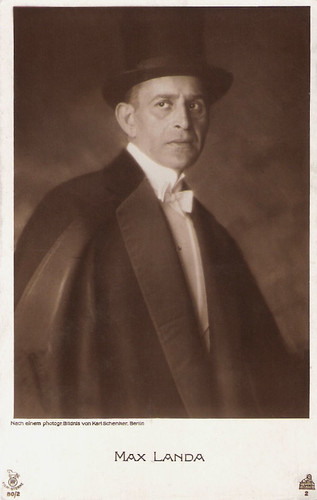
German postcard by Rotophot in the Film Sterne Series, Berlin-Wilm., no. 80/2. Photo: Karl Schenker, Berlin.
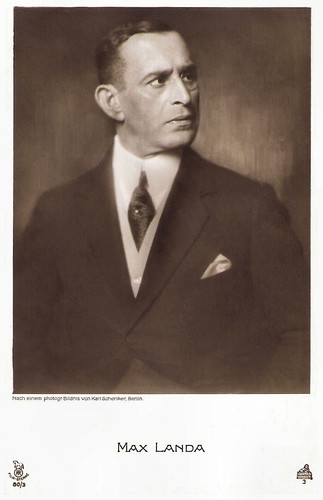
German postcard by Rotophot in the Film Sterne series, no. 80/3. Photo: Olivieri / Karl Schenker.
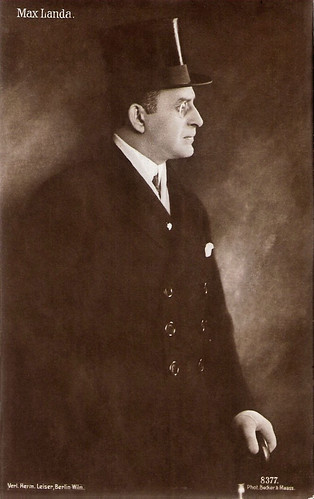
German postcard by Verlag Hermann Leiser, Berlin, no. 8377. Photo: Becker & Maass.
Max Landa was born as Max Landau in Vienna, then Austria-Hungary, in 1880 (some sources say in Minsk, Russian Empire in 1873).
He started acting on stage when he was 19, and performed in several theatres in Austria and Germany.
He made his film début film in Die Suffragette/The Suffragette (Urban Gad, 1913) starring Asta Nielsen.
He then played in several films with Nielsen and directed by Urban Gad: Engelein/Little Angel (1913/14), Die weisse Rosen/The White Rose (1914), Das Feuer/The Fire (1914) with Ernst Hofmann, the sequel Engelein’s Hochzeit/Little Angel's Wedding (1916) with Bruno Kastner, Die ewige Nacht/The Eternal Night (1916), and Aschenbrödel/Cinderella (1916).
In 1914 Landa played together with leading man Ernst Reicher in the Stuart Webbs crime serial films Die geheimnisvolle Villa/The Mysterious Villa (Joe May, 1914) and Der Man im Keller/The Man in the Cellar (Joe May, 1914). He then starred in his own serial around the detective character Joe Deebs, from 1915 on.
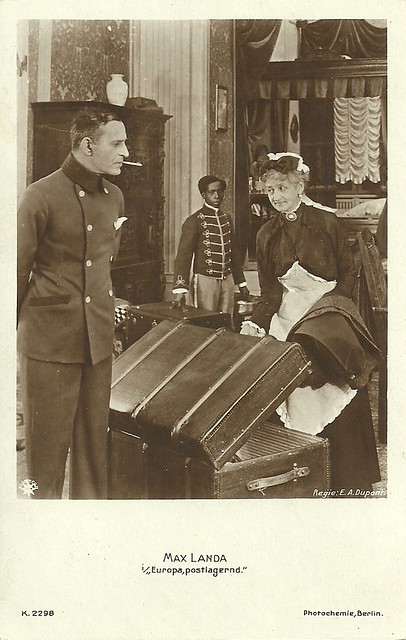
German postcard by Photochemie, no K. 2298. Photo: Stern-Film. Publicity still for Europa Postlagernd/Europe poste restante (Ewald André Dupont, 1918) with Landa as Joe Deebs.
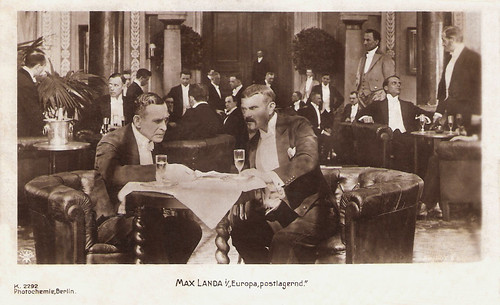
German postcard by Photochemie, no K. 2292. Photo: Stern-Film. Publicity still for Europa Postlagernd/Europe poste restante (Ewald André Dupont, 1918).
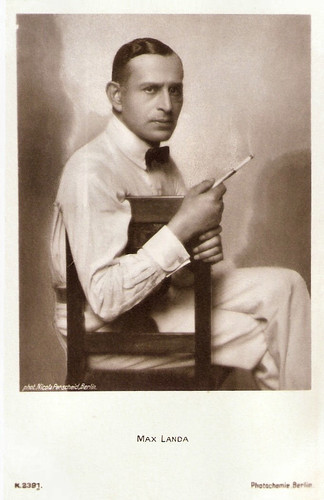
German postcard by Photochemie, Berlin, no. K 2391. Photo: Nicola Perscheid, Berlin.
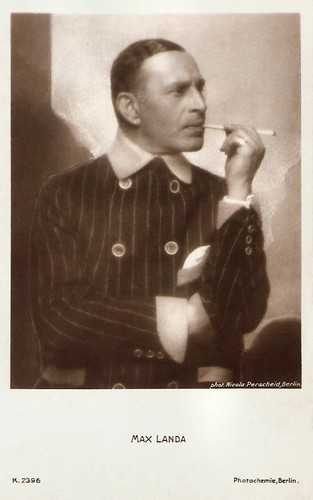
German postcard by Photochemie, Berlin, no. K 2396. Photo: Nicola Perscheid, Berlin.
After the war Max Landa continued to perform as a detective in a succession of crime and adventure films by Ewald André Dupont, produced by Stern-Film: Europa postlagernd/Europe poste restante (1918), Mitternacht/Midnight (1918), Der Teufel/The Devil (1918), Die Japanerin/The Japanese Woman (1919), Das Geheimnis des Amerika-Docks/The Secret of the America Docks (1919), Die Apachen/The Apaches (1919), Die Maske/The Mask (1919), Die Spione/ The Spies (1919), Das Derby/The Derby (1919), Der Würger der Welt/The Strangler of the World (1919), and Das Grand Hotel Babylon/The Grand Hotel Babylon (1919).
Max Landa then played the tragic Rudolf, Crown Prince of Austria in Kaiserin Elisabeth von Österreich/Empress Elisabeth of Austria (Rolf Raffé, 1920).
In 1920 Landa played in a series of crime and detective films with actress Hilde Wörner, who had her own production company.
He also acted once more with Asta Nielsen in Die Geliebte Roswolskys/The Beloved Roswolky's (Felix Basch, 1921), opposite Paul Wegener as Roswolsky.
In 1921 Landa also founded his own Max-Landa Film company for which he produced five films in 1921-1922: Der Passagier von Nr. 7/The passenger of No. 7 (Willy Zeyn, 1921) with Hanni Weisse, Die schwarze Schachdame/The Black Chess Lady (Heinz Herald, 1922), Die Perlen der Lady Harrison/The Pearls of Lady Harrison (Heinz Herald, 1922), Der politische Teppich/The Political Carpet (Heinz Herald, 1922), and Das Licht um Miternacht/The Light at Midnight (Hans von Wolzogen, 1922).
After that, Landa continued to play in German films, but had to satisfy with antagonistic and supporting roles, as in the two-part adventure film Der Flug um den Erdball/The Flight Around the earth (Willi Wolf, 1924) with Ellen Richter, the Manfred Noa society comedies Soll man heiraten?/Should One Marry? (Manfred Noa, 1925) with Vilma Bánky and Warum sich scheiden lassen/Why Divorce? (Manfred Noa, 1926), Die leichte Isabell/Easy Isabell (Eddy Busch, Arthur Wellin, 1927) with Lee Parry and after the operetta by Jean Gilbert, and Anastasia, die falsche Zarentochter/Anastasia, the False Czar's Daughter (Arthur Bergen, 1928) starring Camilla von Hollay.
After 1928 Max Landa quitted playing in film. In 1933, he died in Bled, Yugoslavia (now Slovenia), only 53 years old (or 60 according to some sources).

German postcard by Verlag Hermann Leiser, Berlin, no. 9554. Caption: Max Landa in seinem heim (Max Landa at home).
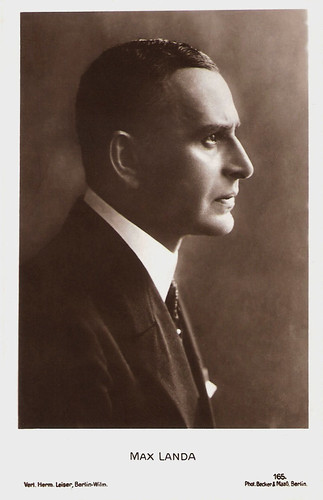
German postcard by Verlag Hermann Leiser, Berlin-Wilm., no. 165. Photo: Becker & Maass, Berlin.
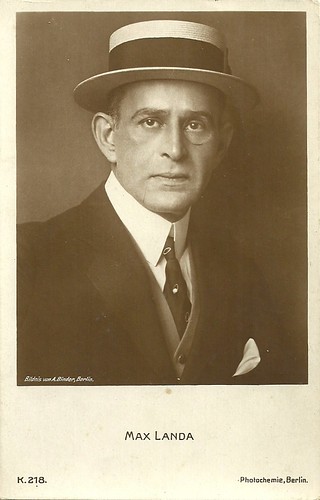
German postcard. Photochemie, Berlin, K. 218. Photo A. Binder, Berlin.
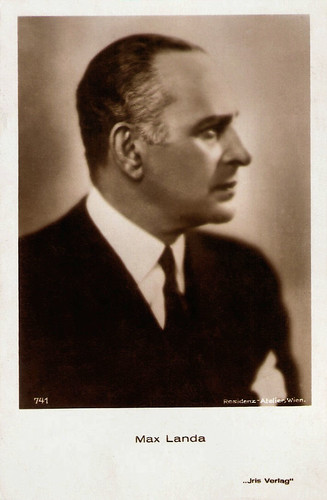
Austrian postcard by Iris Verlag, no. 741. Photo: Residenz-Atelier Wien.
Sources: Thomas Staedeli (Cyranos), Filmportal.de and IMDb.

German postcard by Rotophot in the Film Sterne Series, Berlin-Wilm., no. 80/2. Photo: Karl Schenker, Berlin.

German postcard by Rotophot in the Film Sterne series, no. 80/3. Photo: Olivieri / Karl Schenker.

German postcard by Verlag Hermann Leiser, Berlin, no. 8377. Photo: Becker & Maass.
Detective Joe Deebs
Max Landa was born as Max Landau in Vienna, then Austria-Hungary, in 1880 (some sources say in Minsk, Russian Empire in 1873).
He started acting on stage when he was 19, and performed in several theatres in Austria and Germany.
He made his film début film in Die Suffragette/The Suffragette (Urban Gad, 1913) starring Asta Nielsen.
He then played in several films with Nielsen and directed by Urban Gad: Engelein/Little Angel (1913/14), Die weisse Rosen/The White Rose (1914), Das Feuer/The Fire (1914) with Ernst Hofmann, the sequel Engelein’s Hochzeit/Little Angel's Wedding (1916) with Bruno Kastner, Die ewige Nacht/The Eternal Night (1916), and Aschenbrödel/Cinderella (1916).
In 1914 Landa played together with leading man Ernst Reicher in the Stuart Webbs crime serial films Die geheimnisvolle Villa/The Mysterious Villa (Joe May, 1914) and Der Man im Keller/The Man in the Cellar (Joe May, 1914). He then starred in his own serial around the detective character Joe Deebs, from 1915 on.

German postcard by Photochemie, no K. 2298. Photo: Stern-Film. Publicity still for Europa Postlagernd/Europe poste restante (Ewald André Dupont, 1918) with Landa as Joe Deebs.

German postcard by Photochemie, no K. 2292. Photo: Stern-Film. Publicity still for Europa Postlagernd/Europe poste restante (Ewald André Dupont, 1918).

German postcard by Photochemie, Berlin, no. K 2391. Photo: Nicola Perscheid, Berlin.

German postcard by Photochemie, Berlin, no. K 2396. Photo: Nicola Perscheid, Berlin.
Antagonistic and Supporting Roles
After the war Max Landa continued to perform as a detective in a succession of crime and adventure films by Ewald André Dupont, produced by Stern-Film: Europa postlagernd/Europe poste restante (1918), Mitternacht/Midnight (1918), Der Teufel/The Devil (1918), Die Japanerin/The Japanese Woman (1919), Das Geheimnis des Amerika-Docks/The Secret of the America Docks (1919), Die Apachen/The Apaches (1919), Die Maske/The Mask (1919), Die Spione/ The Spies (1919), Das Derby/The Derby (1919), Der Würger der Welt/The Strangler of the World (1919), and Das Grand Hotel Babylon/The Grand Hotel Babylon (1919).
Max Landa then played the tragic Rudolf, Crown Prince of Austria in Kaiserin Elisabeth von Österreich/Empress Elisabeth of Austria (Rolf Raffé, 1920).
In 1920 Landa played in a series of crime and detective films with actress Hilde Wörner, who had her own production company.
He also acted once more with Asta Nielsen in Die Geliebte Roswolskys/The Beloved Roswolky's (Felix Basch, 1921), opposite Paul Wegener as Roswolsky.
In 1921 Landa also founded his own Max-Landa Film company for which he produced five films in 1921-1922: Der Passagier von Nr. 7/The passenger of No. 7 (Willy Zeyn, 1921) with Hanni Weisse, Die schwarze Schachdame/The Black Chess Lady (Heinz Herald, 1922), Die Perlen der Lady Harrison/The Pearls of Lady Harrison (Heinz Herald, 1922), Der politische Teppich/The Political Carpet (Heinz Herald, 1922), and Das Licht um Miternacht/The Light at Midnight (Hans von Wolzogen, 1922).
After that, Landa continued to play in German films, but had to satisfy with antagonistic and supporting roles, as in the two-part adventure film Der Flug um den Erdball/The Flight Around the earth (Willi Wolf, 1924) with Ellen Richter, the Manfred Noa society comedies Soll man heiraten?/Should One Marry? (Manfred Noa, 1925) with Vilma Bánky and Warum sich scheiden lassen/Why Divorce? (Manfred Noa, 1926), Die leichte Isabell/Easy Isabell (Eddy Busch, Arthur Wellin, 1927) with Lee Parry and after the operetta by Jean Gilbert, and Anastasia, die falsche Zarentochter/Anastasia, the False Czar's Daughter (Arthur Bergen, 1928) starring Camilla von Hollay.
After 1928 Max Landa quitted playing in film. In 1933, he died in Bled, Yugoslavia (now Slovenia), only 53 years old (or 60 according to some sources).

German postcard by Verlag Hermann Leiser, Berlin, no. 9554. Caption: Max Landa in seinem heim (Max Landa at home).

German postcard by Verlag Hermann Leiser, Berlin-Wilm., no. 165. Photo: Becker & Maass, Berlin.

German postcard. Photochemie, Berlin, K. 218. Photo A. Binder, Berlin.

Austrian postcard by Iris Verlag, no. 741. Photo: Residenz-Atelier Wien.
Sources: Thomas Staedeli (Cyranos), Filmportal.de and IMDb.
No comments:
Post a Comment